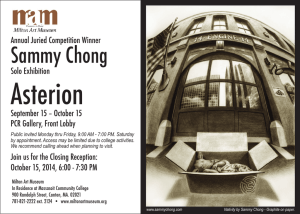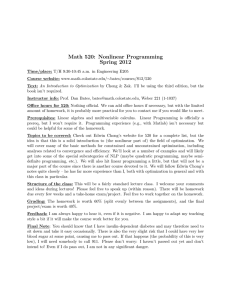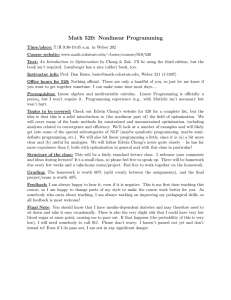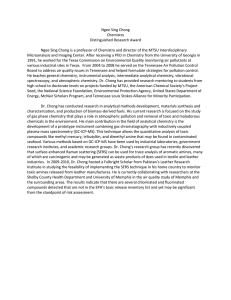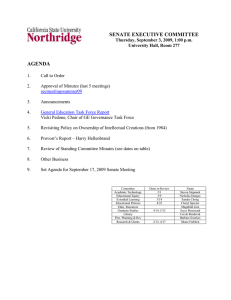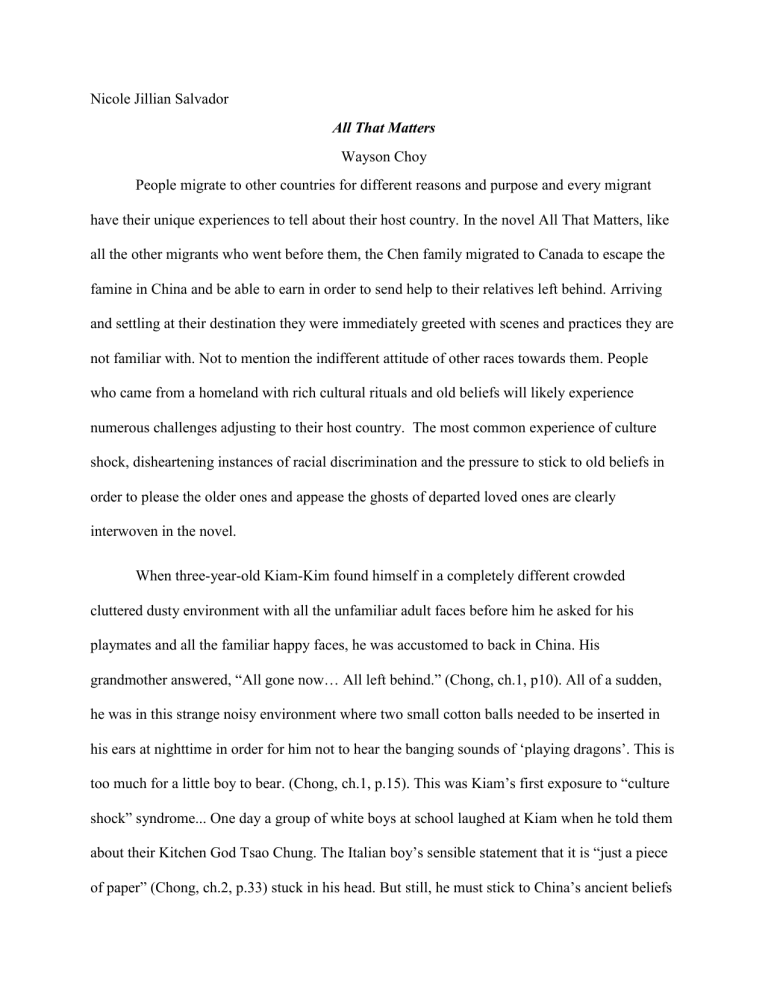
Nicole Jillian Salvador All That Matters Wayson Choy People migrate to other countries for different reasons and purpose and every migrant have their unique experiences to tell about their host country. In the novel All That Matters, like all the other migrants who went before them, the Chen family migrated to Canada to escape the famine in China and be able to earn in order to send help to their relatives left behind. Arriving and settling at their destination they were immediately greeted with scenes and practices they are not familiar with. Not to mention the indifferent attitude of other races towards them. People who came from a homeland with rich cultural rituals and old beliefs will likely experience numerous challenges adjusting to their host country. The most common experience of culture shock, disheartening instances of racial discrimination and the pressure to stick to old beliefs in order to please the older ones and appease the ghosts of departed loved ones are clearly interwoven in the novel. When three-year-old Kiam-Kim found himself in a completely different crowded cluttered dusty environment with all the unfamiliar adult faces before him he asked for his playmates and all the familiar happy faces, he was accustomed to back in China. His grandmother answered, “All gone now… All left behind.” (Chong, ch.1, p10). All of a sudden, he was in this strange noisy environment where two small cotton balls needed to be inserted in his ears at nighttime in order for him not to hear the banging sounds of ‘playing dragons’. This is too much for a little boy to bear. (Chong, ch.1, p.15). This was Kiam’s first exposure to “culture shock” syndrome... One day a group of white boys at school laughed at Kiam when he told them about their Kitchen God Tsao Chung. The Italian boy’s sensible statement that it is “just a piece of paper” (Chong, ch.2, p.33) stuck in his head. But still, he must stick to China’s ancient beliefs so as not to offend the ancient spirits. The food that they are eating also became a point of comparison. Jack and his parents find it disgusting and the smell is always unpleasant to them. Although Kiam got to taste other food at Jack’s house he will always appreciate what his Old One always prepare in their table. All of these encounters of seeing the big difference of Chinese ways and the ways of the host country enabled Kiam to walk circumspectly as he come of age so as not to offend either side. The Chinese people experienced inhumane treatments from white people in Canada. Third Uncle told Kiam that they are being labelled as ‘chinks’ as a form of ridicule (Chong, ch.1, p.90) Stories of white people kicking Chinese people and bashing their heads as well as destroying businesses in Chinatown were recounted to Kiam’s grandmother by the wives of Tong leaders (Chong, ch.1, p.52). When the railroad construction closed many Chinese migrants lost their jobs and ended up living in crowded houses hardly surviving on their day to day living. Kiam witnessed how his grandmother would go around and knock on those doors to share what ever little food they have left in order to fill some empty stomachs. Their miserable living condition was engraved in Kiam’s young mind. To top it all, they don’t have their family by their side as they experience such hard times. This is largely due to the passing of a law that openly discriminated the Chinese people. “The Tong elders were not unsympathetic to the bachelor men in Chinatown who, more than fifteen and twenty- five years before, had left behind their families in China, and were now unable to bring over those same wives and families because of the 1923 Chinese Exclusion Act” (Chong, ch.1, p18). Because of this, those who can afford to bring in relatives must use “ghost papers” and pay huge sums of money. This is such a great emotional and mental ordeal to the migrant and to their families that they were unable to see for a long time. Kiam-Kim was very much aware of this since childhood and feels sorry for his own people. Kiam himself had his own experiences of discrimination which no doubt affected him greatly emotionally and mentally as he grew up. “At those times, I thought of all the wrinkle-faced people, white haired people with furrowed brows from eastern European countries and from Italy, who sat on their porches and on the steps along Keefer Street, and how sadly they sometimes looked upon the lot of us white and yellow kids romping together on the streets. Their disapproving glances and shouts for their grandchildren to rejoin them on the porch made me think they all longed for us to be among our own kind, just as they once were: children of a single language and a single community” (Chong, ch.2, p.22). Since boyhood, the urgings and pressure to stick to Chinese practices and old beliefs in order to please the Old One and appease the ghosts of departed loved ones has been part of Kiam’s daily existence. “‘The cries of a dragon’, said Poh-Poh. Father said, ‘Just the train coming to a stop Kiam-Kim,’ But the Old One’s voice was so certain that I held my breath” (Chong, Beginnings). His belief about dragons became so tangible despite sensible and factual explanations from his father. When he bragged about the coming of his new mother to his friend Jack, he was heavily reprimanded. His grandmother struck him with chopsticks in the head while shouting, “Tell white ears nothing!” To reinforce it his father explained that white people did not understand Chinese ways (Chong, ch.1, p.55). As he grew older, he begun to imbibe the art of being silent about important family matters as he was always told to keep family secrets within their circles. He also begun to realize that his connection to ancient China and its ways are eternal in nature. And that he can never turn his back on it. “Ghosts and old China haunted us, just as they had hunted Third Uncle. Only the still born can leave the past behind” (Chong, ch.1, pp.8-9). Even though a great part of him have been wanting to resist some beliefs and rituals from old China in order adjust well to his host country he personally obliged himself in respect and reverence of the old ones. When his stepmother poured out the sentiments, she has been holding in her heart one day, Kiam realized he was not alone. “‘I chose? I was bought! Even my own two children call me stepmother!’ Both Liang and Sekky averted their eyes. They must have sensed that their mother was battling against invisible and entangled ways. Against their ancient powers, she was as helpless and defenseless as I was” (Chong, ch.9, p.78). As a whole, most immigrants go through numerous challenges as they adjust to their host country most specially in the process of assimilating their old beliefs to their whole new environment. Culture shock is almost always experienced to varying degrees. Some are able to cope instantly and adjust smoothly while others linger long in their process of integration and assimilation. Moreover, racial discrimination has been around since the dawn of time and has caused so many people to suffer physically, emotionally and mentally. It has imputed so much harm to humanity more than anything. In addition, people go through a mental “tug of war” when the desire to keep traditions is more on pleasing others rather than doing what is really in their hearts. In this modern times however, it is much easier to overcome and adjust in the aforementioned concerns with the use of modern technology and worldwide social media. Cultures and traditions around the world can be easily studied to be prepared before stepping in the country that people would want to visit or migrate to. Although the actual experience will serve as the gauge, but the awareness of what will be expected and encountered is already a big edge for smooth assimilation and integration.
